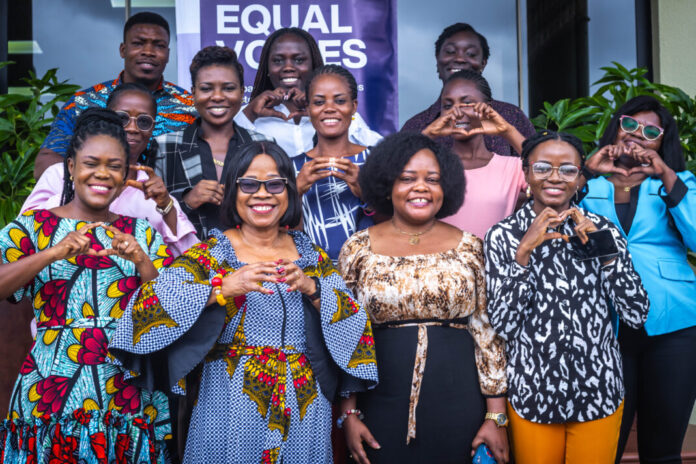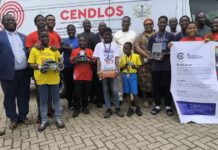
The Media Foundation for West Africa (MFWA) in partnership with the French media development agency, Canal France International (CFI), has trained 32 female journalists, including freelancers, in Ghana and Côte d’Ivoire on women empowerment.
The initiative forms part of efforts to promote gender equality in the media in the two countries under the project titled Equal Voices.
The objective of the project is to combat gender inequalities and stereotypes while promoting women at all levels of responsibility in Ivorian and Ghanaian societies through gender-aware and gender-sensitive media practices.
The women empowerment training strengthened the skills and leadership capacities of the female journalists to feel able to pursue professional aspirations and career goals contributing to a better representation of women and their concerns in the media.
It also enhanced their knowledge on the concepts, theories and underpinnings of gender and women’s rights, challenges and critical trends as well as the media’s role in promoting women empowerment.
In her remarks at the opening of the training, in Ghana, the MFWA’s Programme Director for Media and Good Governance, Abigail Larbi, bemoaned the dwindling numbers of females in editorial and leadership roles in news media organisations and encouraged participants to avail themselves for such roles.
“When we continue to discuss issues confronting gender inequality, and we’re emboldened to speak up, we get empowered as women. We need to take up positions and also be at the top with the men. There’s more than enough room for both women and men,” he said.
The training workshop, in addition, enhanced the capacities of the female journalists to advocate for and develop organizational policies that foster women’s representation as agents of change.
Participants also engaged in practical story development sessions, receiving guidance to produce and publish more gender-sensitive reports contributing to a more balanced and inclusive representation in media.
Some seasoned media managers and news editors were also invited to share their leadership journeys and challenges with the participants. Issues such as conflict management, supervisor-subordinate relationship, male competition, public speaking and managing online presence were highlighted.
Some of the participating female journalists shared their feedback on the training.
Christiana Anyang-Mintah from Ghana Broadcasting Corporation shared with the team that, “This workshop has been very enlightening.
I have come to be more self-aware. I’m also taking away lessons on how to better work with people within my professional environment as well as external characters who may influence my work in one way or another. My output on gender-sensitive reports will be more than I was producing prior to participating in this training.”
In September 2023, the MFWA and CFI launched the Equal Voices project to strengthen the capacities of female and male media professionals to establish and develop managerial and editorial policies that promote a better representation of women and a more balanced gender representation.
Eight media organisations – four each in Côte d’Ivoire and Ghana – were competitively selected as beneficiaries of the project.
Media managers from the selected media organisations also engaged in coaching and mentorship sessions where they were trained to be more gender-aware and institute gender-sensitive policies in their newsrooms.
For instance, the Media manager for Radio Soliel CI+ in Côte d’Ivoire, Mambo Marietou, in a conversation with the MFWA, shared how the project has impacted her media organization: “We have set up a gender-focused show and have introduced a programme for young girls called “Entre Nous Filles” (Between us girls). We have also revised the content of the already existing women’s programme, “Entre Nous Femmes” (Between us women).
“To promote gender balance in the newsroom, we have also recruited a young female host who will soon start hosting our new show, “Planète Soleil”, where we’ll discuss a range of topics. We’re also in the process of developing a gender policy.”
In Ghana, the Head of Programmes at Radio Justice, Yunus Mumuni also said, “Aside from the eye-opening trainings for our staff, the peer-to-peer coaching sessions for media managers have helped us to put in place a number of initiatives.
We have designed a new show called Agenda 30%. It will be hosted by one of our reporters who is a beneficiary of the gender-sensitive reporting trainings and feature discussions on female representation in governance generally and especially towards Ghana’s 2024 elections. We also now have a female journalist who hosts The Super Morning show on Thursdays; previously, the show was hosted by only men.”
Also in Ghana, the General Manager for A1 Radio, William Jalulah, said “As a result of the enhanced capacity received under the Equal Voices project, we have created a new show called “Equal Voices”. And hosted by Humu-Khrusum Tahiru, one of the project training beneficiaries. I’m also putting things in place to set up a Gender desk in the newsroom where gender-related stories will be reported and produced from”.
So far 40 journalists – males and females, have benefited from the gender-sensitive and women empowerment trainings under the project and receiving mentoring and coaching for quality story development in order to produce and publish more gender-sensitive reports.
Credit: Media Foundation for West Africa




